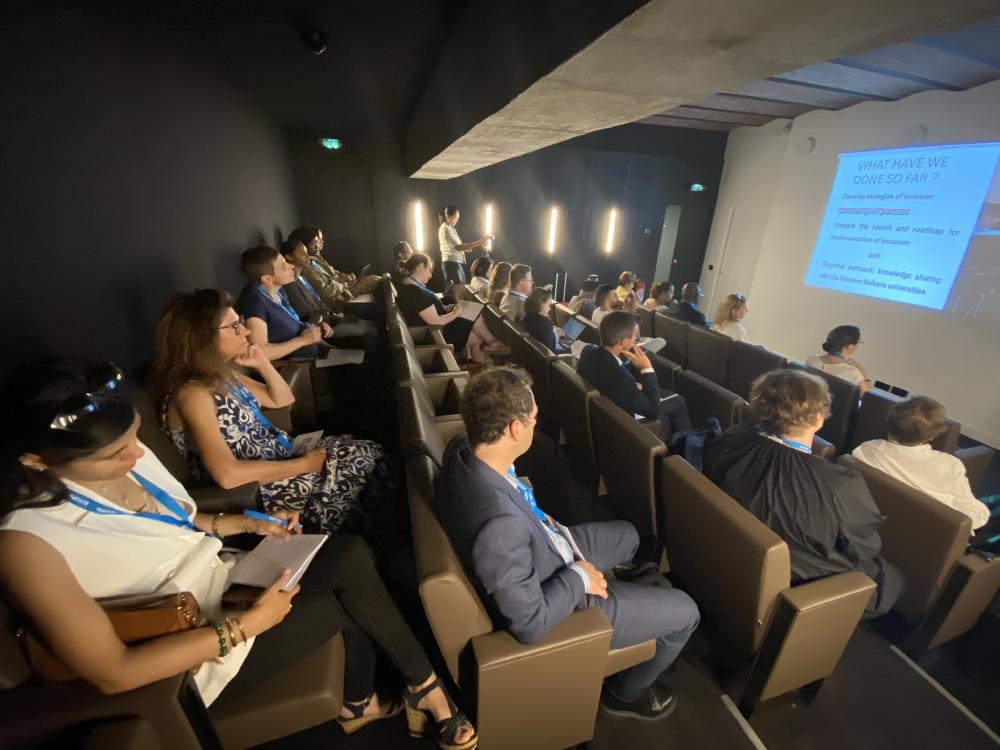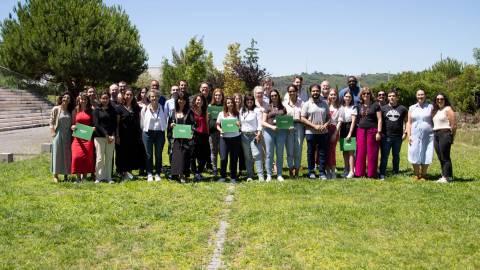Testimonial from the Inclusion Expert Seminar, June 2022

Testimonial by Cheyma Al Mehraj, Project Lead on Diversity and Inclusion for EUTOPIA at the VUB, on the EUTOPIA Inclusion Expert Seminar, held on June 17th 2022, at CY Cergy Paris Université.
Bridging the Gap: Designing Higher Education Policies through Inclusion Narratives
The power of storytelling in the process of designing higher education policies.
Being part of EUTOPIA's Work Package 5 – Diversity and Inclusion, I was invited to the Inclusion Seminar organized by CY Université, one of the partner universities from the Eutopia alliance.
The seminar intended to bring in “expert by experience” voices (students and external stakeholders, including other alliances and a member of the European Parliament), which narratives are important to understand the shared meaning of disadvantage, develop recommendations and initiatives, design strategies, methods, research programs and raise awareness of diversity. This is what the program description stated.
How does one become an expert by experience in the field of social inclusion, you must ask. Well, let’s say it’s a form of knowledge based on personal experiences. They’re basically social inclusion professionals. They’re at the heart of an important and inspiring methodology. Including people’s real life experiences, dialogue and consultation in the management of policies is a key element in the work of the Diversity and Inclusion Work Package.
For this seminar two amazingly inspiring and uplifting experts by experience were invited, Mariam Ouarti and Pierre Kompany.
Mariam Ouarti, an Alumnus of the Nasa Advanced Space Academy. Her leadership position as a commander in the U.S. Space & Rocket Center both during Space Camp and U.S Aviation Challenge gave her an early insight into endorsing inclusion among her diverse international team. Her experience in the White House (2016) and in the Cop22 (2017) as a representative of the young scientists, as well as her work with Syrian refugee students emerged her in the issue of access and inclusion in Academia. Being herself a student who encountered discrimination on four different continents, while also suffering from a mobility disability, Mariam is deeply concerned about inclusion in Higher Education. Her involvement in this cause made her shift from studying medicine to studying sociology and political science. She is currently a student in the Social Sciences program held by the VUB and UGent.
What an amazing journey, at such a young age. That’s exactly what I thought when I first met Mariam. This short biography is just a glimpse of this young woman’s life experience. Starting her speech with the following words: “Am I good enough to be one of you?”, she immediately got everyone’s attention. In a way everyone felt exactly what she was talking about, since I’m pretty sure every human being can think of a moment when she or he felt they didn’t belong. It’s not a feeling you easily forget. More so, exclusion hurts and thinking of times when you didn’t fit in because of something you couldn’t control can teleport you right back into that sad, pit-in-your-stomach feeling. And that’s exactly what Mariam managed to do with the audience. We felt her and we related to her and her story.
At the end of her speech, I looked around in the audience and tears were rolling all over the place. Well, that my dear friends is the power of storytelling. Her story helped us face the reality we’re living in, with eyes open and give us reason to hope and work, despite seemingly impossible odds. Her story connected us to one another across time and space and all sorts of boundaries. Out of the blue I found myself in a true safe space, where it is ok to be my full self without having to filter what I want to say.
Her story made us realize doing inclusion and creating a sense of belonging, as professor Karen Celis mentioned during the seminar, is hard work, but of outmost importance. Professor Karen Celis gave a short keynote about the importance of active listening when doing inclusion. You must wonder why it is important to have an audience that actively listens? Well, it gives us an opportunity to learn from another person’s experience and it can shape, strengthen or challenge our opinions and values. When a story catches our attention and engages us, we are more likely to absorb the message than if the same message was presented simply in facts and figures. Shortly, it is about paying attention and taking into consideration. Professor Celis then continues by stating that doing inclusion requires an architecture for listening.
I think I can conclude by simply saying that this seminar was a true experience itself, it was a feeling and a safe space. Based on what I’ve heard during this seminar I can only conclude that the best Inclusion strategy go so much further in cultures where people feel they belong because when we’re seen and valued for who we really are — our own unique and authentic selves — we thrive, and so do the people around us. This is definitely something I will take with me in the work that we our realizing with the whole Work Package Diversity and Inclusion in order to create the future European University where everyone is good enough to belong.
Let’s keep sharing these stories in order to connect, inspire, create and change.
As Mariam said: Once we build bridges on truth they will stay, if we build them on illusion they will fall.
Cheyma Al Mehraj, 15/07/2022

